Shri Dharmendra Pradhan inaugurates Akhil Bharatiya Shiksha Samagam 2025 in New Delhi to commemorate 5 years of NEP 2020
Shri Dharmendra Pradhan inaugurates Akhil Bharatiya Shiksha Samagam 2025 in New Delhi to commemorate 5 years of NEP 2020
Shri Dharmendra Pradhan, Union Education Minister today inaugurated Akhil Bharatiya Shiksha Samagam 2025 in New Delhi to commemorate 5 years of NEP 2020. The Akhil Bharatiya Shiksha Samagam (ABSS) 2025, marking the fifth anniversary of the National Education Policy (NEP) 2020, ABSS 2025 served as a platform for academicians, policymakers, educators, industry leaders, and government representatives to review the remarkable progress made under NEP 2020 and chart the way forward.
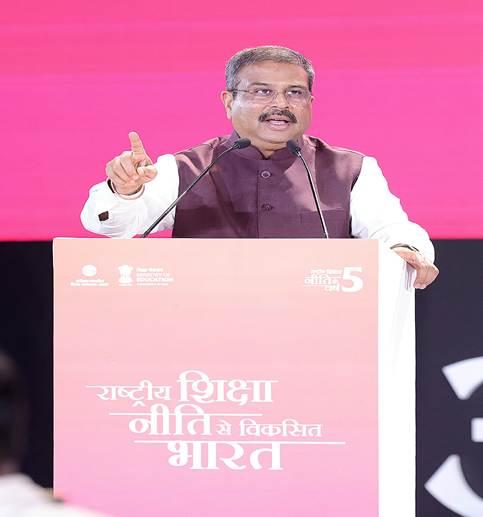
Minister of State for Education & Minister of State (IC), Ministry of Skill Development & Entrepreneurship Shri Jayant Chaudhary; Minister of State for Education & Development of North Eastern Region, Dr. Sukanta Majumdar; and Education Ministers from 13 State/ UTs also graced the occasion. Dr. Vineet Joshi, Secretary, Department of Higher Education; Shri Sanjay Kumar, Secretary, Department of School Education & Literacy; Prominent academicians; Chairperson; Head of Autonomous Bodies under MoE; Regional Officers of CBSE, KVS, NVS; VCs / Directors / Heads of HEIs, senior officials from other Ministries, State Education Secretaries, State Project Directors of Samagra Shiksha, SCERT Directors, Startup Founders; school students were present on the occasion.
The event commenced with dignitaries paying floral tributes to Padma Vibhushan Dr. K. Kasturirangan, Chairman of the Drafting Committee of the National Education Policy (NEP) 2020, in recognition of his visionary leadership and pioneering contributions to India’s education and space sectors. This was followed by a welcome song presented by students of Kendriya Vidyalayas, setting a vibrant tone for the occasion. Minister of State Shri Jayant Chaudhary also read out the Hon’ble Prime Minister’s message on the 5th anniversary of NEP 2020.
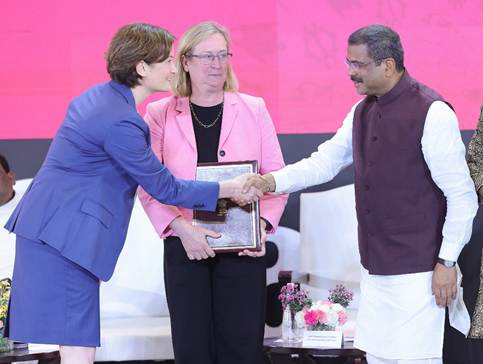
Speaking on the occasion, Shri Dharmendra Pradhan extended his heartfelt wishes on the successful completion of five years of the National Education Policy (NEP) 2020.
He stated that NEP 2020 reflects the transformative vision of Prime Minister Shri Narendra Modi, who places education at the heart of India’s growth story. He further remarked that as the nation moves towards the vision of “Viksit Bharat 2047,” the National Education Policy serves as a national mission guiding the way forward.
He highlighted that over the past five years, the government has succeeded in taking NEP 2020 from policy to practice — bringing about a paradigm shift in the education system and reaching classrooms, campuses, and communities.
Shri Pradhan noted that Indian ethos lies at the core of NEP 2020. With a strong focus on scientific education, innovation, research, Indian knowledge systems, and Indian languages, the policy aligns education with the broader goal of nation-building.
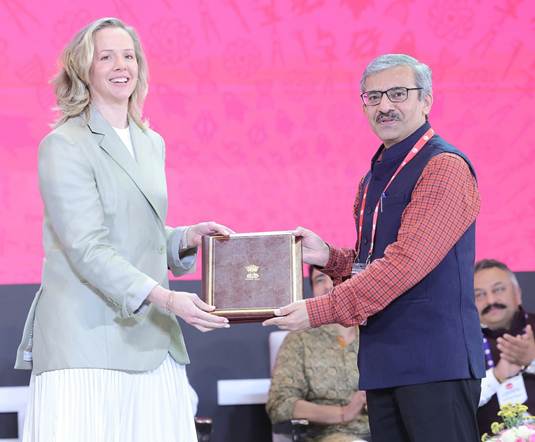
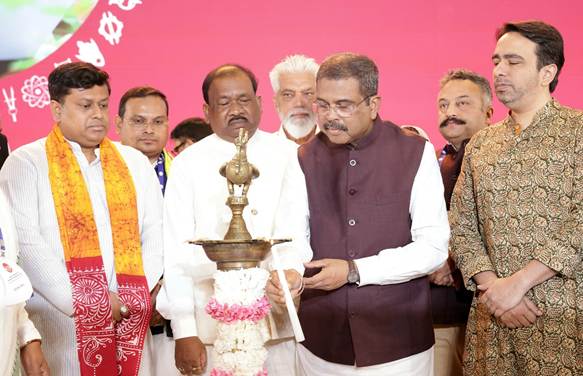
He emphasised that ‘Viksit Bharat’ is not merely a vision but a powerful call to action given by Prime Minister Modi. According to him, NEP 2020 is the most impactful instrument to realise this dream. He urged all stakeholders to take focused and proactive steps to ensure that every classroom becomes a space for meaningful learning and that every child’s potential is nurtured.
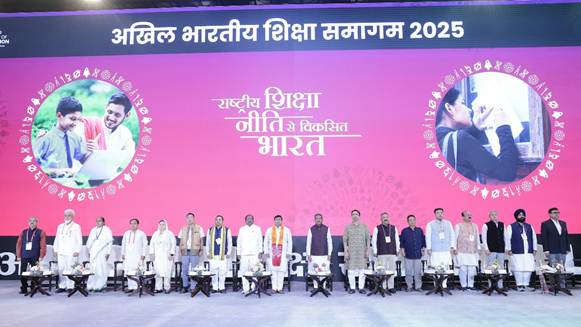
He concluded by stating that the Akhil Bharatiya Shiksha Samagam is not just a conclave, but a collective expression of the national resolve to build a developed India. He called upon everyone to commit wholeheartedly to the effective implementation of NEP 2020 — to move from classrooms to creativity and from learning to nation-building.
Shri Dharmendra Pradhan launched the following initiatives of Department of School Education and Literacy (DoSEL) and Department of Higher Education (DoHE):
Initiatives of DoSEL
Foundation Stone/ Inauguration:
3. KVS: KV ITBP Shivgangai (Tamilnadu); KV Sandhole (Himachal Pradesh): KV Udalguri (Assam); KV BSF Tekanpur (Madhya Pradesh); KV Jourian (Jammu & Kashmir); KV ITBP Shivgangai (Tamilnadu); and KV Bhimtal (Uttarakhand) were inaugurated:
4. NCERT
5. (i) PM JANMAN:
On 15th November 2023, the Prime Minister launched the Pradhan Mantri Janjati Adivasi Nyaya Maha Abhiyan (PM-JANMAN), a transformative initiative aimed at uplifting Particularly Vulnerable Tribal Groups (PVTGs) by bridging gaps in education and essential infrastructure from 2023-24 to 2025-26. The Department of School Education & Literacy (DOSE&L) plays a crucial role, aligning its efforts with the Samagra Shiksha Scheme, while the Ministry of Tribal Affairs (MoTA) serves as the nodal ministry for seamless coordination. A key focus of the Abhiyan is the construction of 500 hostels during the mission period to provide a safe and supportive learning environment for PVTG students. Till date, 492 hostels sanctioned with capacity of 38250 Covering 5668 unserved PVTG Habitation and 788349 PVTG Population with the financial outlay of ₹1234.58 crore (central share of 772.01 crore) has been sanctioned to support this effort. To mark the anniversary of the National Education Policy (NEP) 2020 on 29th July 2025, foundation stones were laid for 75 hostels costing ₹187.35 crore across 8 States.
(ii) DAJGUA:
DA-JGUA (‘Dharti Aaba Janjatiya Gram Utkarsh Abhiyan’) was launched by the Hon’ble Prime Minister on 02.10.2024, which aims at saturation of more than 63,000 tribal majority villages and tribal villages in Aspirational Districts with specified interventions. DAJGUA scheme has a run over period from 2024-25 to 2028-29, targeting construction of 1000 hostels under Samagra Shiksha during the period. The Ministry of Education, Department of School Education & Literacy (DoSE&L) is one of the participating Ministries in the Abhiyan. It is being implemented in convergence with Samagra Shiksha Scheme of this Department keeping with the spirit of NEP 2020. This scheme empowers tribal communities with enhanced access to quality education thereby delivering qualitative and holistic education and skills. Till date, A total of 692 hostels costing ₹ 2512.03 crore (central share of 1933.60 crore) have been approved in the DAJGUA. To mark the anniversary of the National Education Policy (NEP) 2020 on 29th July 2025, foundation stones were laid for 309 hostels costing ₹1190.34 crore across 12 States.
Dedication to Nation:
Digital Launches:
TARA App:
The TARA App Portal aims to enable data-driven decision-making in education governance by providing a robust platform for assessing and improving reading fluency among students in Grades 3–8. It supports structured teaching, targeted remediation, and continuous monitoring of learning outcomes. Key features include:
Impact:
My Career Advisor App:
To empower students with informed career decision-making, the Department of School Education & Literacy (DoSEL), Ministry of Education, Government of India, has launched the “My Career Advisor App”—a comprehensive, student-centric digital platform. Developed in collaboration with the Wadhwani Foundation and PSSCIVE (a constituent unit of NCERT), the app aims to provide personalized career guidance to school students across the country. The app offers access to 1000+ career pathways, including detailed information about job roles, educational requirements, skills needed, and future prospects. It features an intelligent recommendation engine that suggests career options based on students’ interests, aptitudes, and values, making the guidance truly tailored to each user. Designed to be easy-to-use and accessible anytime, anywhere, “My Career Advisor App” also serves as a valuable resource for teachers, school counselors, and career advisors to support their students effectively. By bridging the gap between aspirations and opportunities, this initiative supports the vision of the National Education Policy (NEP) 2020 to provide holistic, integrated, and future-ready education.
Swachh Evam Harit Vidyalaya Rating (SHVR) – 2025-26
SHVR introduces a 5-Star rating system assessing 60 indicators across six categories: water, toilets, handwashing with soap, operation & maintenance, behaviour change & capacity building, and the new Mission LiFE Activities for environmental responsibility.
SHVR builds on this legacy with improved assessment tools, simplified questionnaires, and a robust IT platform developed with NCERT, NIC, and UNICEF. As per revised guidelines, the star rating of a school is applicable for each school. There will be 4 categories of schools for recognition (certificate of merit), which are 3 Rural category-I, 3 Rural category-II, 1 Urban category-I, and 1 Urban category- II, comprising a total of 8 schools at the district level, would be considered for nomination for the State Level for recognition (certificate of merit).
At the State level, recognition (certificate of merit) will be given based on the overall score. A maximum number of 20 schools with a five-star rating, 7 Rural category-I, 7 Rural category-II, 3 Urban category-I, and 3 Urban category-II, those conforming to national-level selection criteria, from each State/UT would be considered for nomination for the National Level for recognition (certificate of merit).
At the national level, 200 top schools shall be recognized with a certificate of merit, considering category-wise schools for recognition as 70 Rural category-I, 30 Urban category-I, 70 Rural category-II, and 30 Urban category-II.
Initiatives of DoHE
National Testing Service National Testing Service-India (NTS-I) conducts research on testing and evaluation and has developed a web-based Local Language Proficiency Test Portal that administers online tests assessing Listening, Speaking, Reading, and Writing (LSRW) skills across 22 Indian languages, featuring a database of 182,480 LSRW items encompassing 1,825 tests. As part of material development, it is also doing research work on Testing and Evaluation in the Indian language.
The Ministry of Education has envisioned the Apprenticeships in Artificial Intelligence (AI) under the National Apprenticeship Training Scheme (NATS). This initiative aims to enhance students’ knowledge and skills in AI to meet the growing industry demands across sectors such as Healthcare, Manufacturing and Construction, Education, BFSI (Banking, Financial Services and Insurance), Electronics, and IT/ITES. The program is expected to benefit approximately 1 lakh students, offering a minimum monthly stipend of ₹9,000 for graduates and ₹8,000 for diploma holders. The total estimated stipend support under the initiative is around ₹500 crore, jointly funded by the government and participating companies.
IIT BHU has introduced a New Age Curriculum designed to offer flexibility and promote multidisciplinary learning for B.Tech. students. Under this curriculum, students can choose from five academic options: (a) B.Tech., (b) B.Tech. (Honours), (c) B.Tech. with a Minor discipline, (d) B.Tech. with a Second Major discipline, and (e) extending B.Tech. to M.Tech. The program allows flexible movement between a second major and a minor, and includes a semester-long internship in industry, research, or start-ups to provide hands-on experience. It also features a flexible entry, exit, and re-entry policy in line with the National Education Policy (NEP). Additionally, limited semester-long student mobility is possible through Memorandums of Understanding (MoUs) with partner institutions.
After over a decade, IIT Delhi has revised its Undergraduate, Postgraduate, and PhD curricula, effective from the academic year 2025–26. The revised structure emphasizes flexibility, hands-on learning, environmental sustainability, and emerging technologies like AI and ML.
The undergraduate curriculum is outcomes-based, offering flexibility in general engineering, sciences, and humanities. Students can pursue minors, specializations, or an honours programme alongside their B.Tech. They may also opt for a five-year dual degree (B.Tech. + M.Tech.) by petitioning for an M.Tech. in any available program. Program changes remain possible after the first year based on merit.
The updated M.Tech./MS (Research) curriculum features a rationalized, outcomes-based structure with a strong industry focus. Key components include a cornerstone project to build teamwork and problem-solving skills, and a summer internship to enhance external engagement. Master’s thesis options in collaboration with industry are also enabled.
The formalized PhD curriculum focuses on developing independent researchers with ethical and transferable skills, while promoting collaboration, domain advancement, and external/industry connect to enhance professional and research excellence.
ViBe is an AI-powered continuous active learning platform developed by the Education Design Lab at IIT Ropar. It ensures true mastery by keeping learners actively engaged through smart checks, adaptive challenges, and real-time feedback.
ViBe intelligently segments lessons into bite-sized, engaging chunks, and uses a powerful AI engine to generate thought-provoking questions that foster deep understanding and sustained curiosity.
Built for large-scale global impact, ViBe promotes an educational experience that is honest, effective, and enjoyable. With its open-access model and scalable architecture, ViBe is poised to transform how the world learns.
Importantly, ViBe also empowers educators by automating routine learning checks, giving them more time and space to focus on experiential and proctored classroom learning. This shift redefines the teacher’s role—enabling them to create richer, more meaningful learning experiences.
The App in line with the goals of NEP 2020, Ek Bharat Shreshth Bharat (EBSB mission) and a part of the Azadi Ka Amrit Mahotsav celebrations, promotes learning any Indian language through any Indian language without having the need of learning English in between.
At present, the app contains a total of 18 conversation courses (485 common domain wise sentences) in 22 Indian languages and 24 vocabulary building courses (1600+ words) in all the supported languages.
Additional features will be added in time to evaluate and also provide self-generated/automated certificates based on app-based evaluation systems.
It will also have an AI based conversation facilitator using which user will be able to communicate with other language speakers in real time.
Centre of Indian Knowledge Systems and Encyclopaedic Dictionary of Sanskrit (IKS-ED) of Central Sanskrit University was established at Deccan College (DU) through the joint efforts of Central Sanskrit University and Sanskrit Dictionary Project, Deccan College, Pune with the approval of the Ministry of Education, Government of India for monitoring Sanskrit Dictionary Project and development of IKS Encyclopaedia and credit based IKS-SWAYAM courses. This Dictionary is a compact Encyclopaedia in the field of Indian Knowledge Systems as it treasures the literary references of every word, concept, notion available in the Sanskrit literature across all the disciplines and period of time. The Encyclopaedic Dictionary of Sanskrit on Historical Principles traces the linguistic development of Sanskrit words from 1500 ancient texts from Rigveda (about 14th Cent. B.C.) to the latest work of Hasyarnava (1850 A.D.) texts spread across 62 disciplines. It provides the detailed linguistic changes that have occurred in various words and their derivations and traces the semantic development of various words. It provides the entire range of meanings prevalent in the Vedas and other texts which are logically analyzed and interlinked. The total number of vocables are more than 15 lakhs and around 1 crore references.
The KoshaSHRI project, funded by the Department of Science & Technology (DST) under the SHRI scheme with C-DAC Pune’s support, has digitized all 35 volumes of the Encyclopaedic Sanskrit Dictionary. It includes over 15 lakh words and 1 crore references from 1500 ancient texts across 62 disciplines.
The KoshaSHRI Online Portal is now ready for public launch with advanced search, article authoring, and Sanskrit font tools, enabling collaborative dictionary development and research. Both the IKS-ED Centre and KoshaSHRI portal are proposed to be inaugurated during the Akhil Bhartiya Shiksha Samagam at Bharat Mandapam, New Delhi in July 2025.
Inauguration / Foundation Laying of Building / Campus
On the occasion, a short film showcasing the key achievements and transformative impact of the National Education Policy (NEP) 2020 was screened, followed by an exhibition featuring innovative initiatives and best practices in school and higher education. The exhibition reflected the NEP’s vision through themes such as experiential learning, AI-driven solutions, inclusive infrastructure, digital transformation, sustainability, and community engagement. Stalls such as Prerana – Experiential Learning Program, Atal Tinkering Labs – AI Innovations, and Vidyanjali & ULLAS – Community Engagement highlighted impactful models from across the country.
On the occasion, in the presence of Shri Dharmendra Pradhan, Following Letters of Intent (LoIs) were presented to leading foreign universities for establishing their campuses in India, marking a major stride towards the internationalisation of Indian higher education under NEP 2020:
1. Western Sydney University (WSU), Australia – Greater Noida
Established in 1989, WSU is a leading public research university with 13 campuses and over 49,000 students across Sydney. Known for its strong commitment to sustainability and social impact, WSU plans to establish a branch in Greater Noida offering:
WSU’s Indian collaborations include partnerships with AIIA for Ayurveda-modern medicine research, the Ministry of Jal Shakti on groundwater management, ICAR on food security, and IISc on neuromorphic engineering.
2. Victoria University (VU), Australia – Noida
Founded in 1916, VU is one of Australia’s few dual-sector institutions offering both higher education and vocational (TAFE) programs. It has a strong offshore presence in China, Malaysia, and Sri Lanka, and is known for applied research in sports science, business, and IT.
VU’s Noida campus is proposed to offer:
• Undergraduate: Business, Data Science, Cyber Security
• Postgraduate: MBA, Master’s in IT
VU has been an active partner in the India-Australia Sports Partnership (launched with Sachin Tendulkar in 2017) and collaborates with AVENU Learning on vocational diploma pathways for Indian learners.
3. La Trobe University, Australia – Bengaluru
With its origins in 1964, La Trobe University is recognized for excellence in applied research, especially in smart cities, molecular sciences, and biotech. Its India campus in Bengaluru will offer:
• Undergraduate: Business (Finance, Marketing, Management), Computer Science (AI, Software Engineering), and Public Health
La Trobe has been a strong academic partner in India through:
• A Joint PhD Academy with IIT Kanpur (health, water, urban planning)
• The ASCRIN network with IIT-Kanpur, BITS Pilani, and TISS on smart cities
• A Bio Innovation Corridor with the BBC supporting biotech start-ups
4. University of Bristol, United Kingdom – Mumbai
Founded in 1909 and ranked #51 in QS World University Rankings 2026, the University of Bristol is a premier UK research university and a member of the Russell Group. It will establish its India presence in Mumbai.
Key Indian collaborations include:
• A 2022 MoU with ATLAS SkillTech University (Mumbai) for joint undergraduate-to-master programs, student exchange, and collaborative research in AI, design, and digital technologies
• A “3+1” degree pathway with Krea University (Sri City), enabling Indian students to complete undergraduate studies in India and pursue master’s degrees at Bristol in innovation, policy, and analytics.
These strategic partnerships reflect India’s commitment to creating a globally connected, inclusive, and innovation-driven higher education ecosystem. As these campuses come to life, they are expected to bring world-class curricula, faculty, and research to Indian students—without the need to go abroad.
ABSS 2025 featured four thematic sessions focusing on key priority areas: the use of Bharatiya Bhasha in teaching and learning; Anusandhan and the Prime Minister’s Research Fellows (PMRF) for nurturing India’s next generation of academic and industry leadership; re-envisioning secondary education to achieve 100% Gross Enrolment Ratio (GER) by 2030; and the transformative role of Artificial Intelligence in teaching and learning.
*******
- CBSE: The newly constructed CBSE Regional Office building in Digha, Patna
- NVS: The following campuses and facilities of NVS were inaugurated